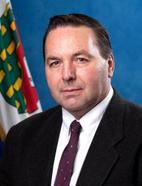Thank you, Mr. Chair. Not during public engagement, there was not any discussion on that or brought forward. Thank you, Mr. Chair.
Wally Schumann
 Legislative Assembly photo
Legislative Assembly photoRoles
In the Legislative Assembly
Elsewhere
- His website
- Twitter (and Twitter messages to him)
- Wikipedia
Crucial Fact
- His favourite word was going.
Last in the Legislative Assembly September 2019, as MLA for Hay River South
Lost his last election, in 2023, with 30% of the vote.
Statements in the House
Committee Motion 224-18(3): Bill 34: Mineral Resources Act - Amend paragraph 28(5)(a) Carried August 20th, 2019
Committee Motion 224-18(3): Bill 34: Mineral Resources Act - Amend paragraph 28(5)(a) Carried August 20th, 2019
We leave positive obligation to circulation notices to Indigenous governments with territory overlapping the claim application area. Thank you, Mr. Chair.
Committee Motion 224-18(3): Bill 34: Mineral Resources Act - Amend paragraph 28(5)(a) Carried August 20th, 2019
Thank you, Mr. Chair. The public would receive notice under section 28(4), and municipal or local governments would be able to access notice. Furthermore, we believe the positive obligation to circulate. That's it. Thank you, Mr. Chair.
Committee Motion 224-18(3): Bill 34: Mineral Resources Act - Amend paragraph 28(5)(a) Carried August 20th, 2019
Thank you, Mr. Chair. We see this motion as unnecessary as municipal or local governments are effectively already required to receive notice. All of the public would receive notice ---
Committee Motion 224-18(3): Bill 34: Mineral Resources Act - Amend paragraph 28(5)(a) Carried August 20th, 2019
No. Thank you, Mr. Chair.
Committee Motion 222-18(3): Bill 34: Mineral Resources Act - Amend Clause 24(7), Defeated August 20th, 2019
Thank you, Mr. Chair. We are going to continue prospecting permits. What we are changing is making this not just a tool for our government, but an Indigenous-led partnership to attract responsible exploration, and we'll continue to do that when we do the regs development and have a look at it. Thank you, Mr. Chair.
Committee Motion 222-18(3): Bill 34: Mineral Resources Act - Amend Clause 24(7), Defeated August 20th, 2019
I will repeat exactly what I said, Mr. Chair. I said, "I myself have a whole lot of confidence in our partners and Indigenous governments to effectively represent their interests. It seems certain Members may not share that confidence." That's what I said, Mr. Chair.
Committee Motion 222-18(3): Bill 34: Mineral Resources Act - Amend Clause 24(7), Defeated August 20th, 2019
Thank you, Mr. Chair. I myself have a whole lot of confidence in our partners and Indigenous governments to effectively represent their interests. It seems that certain Members may not share that confidence.
Zones cannot override requirements under any other legislation. The favourable terms are limited to how mineral interests are acquired and maintained. They cannot cover things like water or environmental rules, which are rightly enshrined in other legislations. We plan to set out the baseline of what kind of incentives are allowed within a zone in regulations in partnership with Indigenous governments and stakeholders. We don't believe that this is all that different than regimes in places like Manitoba, Ontario, and the Yukon. Members can rest assured that there are examples in place.
Furthermore, we believe that the checks and balances offered by the Executive Council engagement with Indigenous governments is more than enough to prevent this kind of issue. We should also note the reality that exploration is driven by geology and not by incentives. Incentives are simply a tool to enhance how and where that happens. Thank you, Mr. Chair.
Committee Motion 222-18(3): Bill 34: Mineral Resources Act - Amend Clause 24(7), Defeated August 20th, 2019
Thank you, Mr. Chair. Yes, but we would have to consult with Indigenous governments. Thank you, Mr. Chair.
Committee Motion 222-18(3): Bill 34: Mineral Resources Act - Amend Clause 24(7), Defeated August 20th, 2019
Thank you, Mr. Chair. Zones can be created by a nomination from Indigenous governments. Zones were included in the bill to create a method for Indigenous governments to drive where and how they could attract investment within their lands if they so choose. Zones were intended to provide greater certainty for industry by indicating where Indigenous governments would welcome greater exploration. We are trying to encourage early exploration, which is fundamental to our government's position that we need exploration to foster new, responsible development and hopefully results in discoveries that could be our future mines. This is our solution to doing it in way that not only respects Indigenous governments, but allows them to have a say in how they wish to benefit from mineral exploration. We also have to remember that zones are temporary and can be adjusted with the agreement of IGOs if they have met the goal in the creation of that zone. Thank you, Mr. Chair.